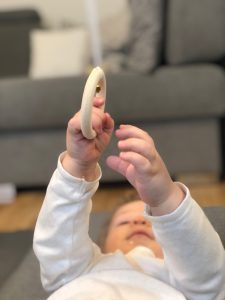Ever caught your baby giving you that sly look, as if they’re plotting world domination from their high-chair? Well, get ready for a journey into the world of Montessori parenting. In the enchanting realm of Montessori philosophy, every interaction with a child is viewed as an opportunity for growth and discovery. Maria Montessori, a pioneer in early childhood education, emphasized the profound impact of the environment on a child’s development. For parents navigating the wondrous journey of raising a baby following her principles, Montessori observation emerges as a cornerstone of understanding, connection, and fostering independence. In a world where every moment can be a big step and every little action a clue, this guide helps you understand how carefully watching and understanding your baby can make a big difference.
What is Montessori Observation and why we do it?
Observation plays a key role in Montessori education—it allows us to understand babies without any judgment. It’s not just watching; it’s really paying attention to how they behave, what they do, and how they interact with everything around them—be it other children, their Montessori toys, or the environment.
Why do we do this? Well, it’s like having a sneak peek into their world. To get to know each child’s unique skills, interests, and needs. We want to create a safe space for them where they can be independent and lead their own learning adventures.
She [the teacher] observes in order to recognize the child who has attained the power to concentrate and to admire the glorious rebirth of his spirit.
Maria Montessori – The Absorbent Mind
Benefits of Montessori Observation for parents
Montessori Observation, however, it’s not just for teachers. By watching how your baby plays, what they love, and when they hit those exciting milestones, you get a front-row seat to their world. Let’s break this down:
- Building a Deeper Connection with Your Baby: Watch and learn about your child’s unique style, interests, and needs. You’ll soon learn how to build a strong bond with them and offer just the right kind of support.
- Tailoring the Environment to Your Baby’s Needs: Through observation, you can figure out what activities and toys your baby loves the most. This way, you can set up an environment that’s just perfect for their development. Read more about how to get started here.
- Fostering Independence and Self-Discovery: the Montessori approach supports letting babies make their own choices and learn from their adventures. By keeping an eye on their playtime and problem-solving skills, you can watch every step of their journey of self-discovery.
- Recognizing and Supporting Developmental Milestones: Observation helps you spot those big and small wins in your child’s growth. From first steps to mastering new skills, it’s your front-row seat to celebrate their achievements, offer the best support they might need and share these once-in-a-lifetime moments with them.
Practical Tips for effective Montessori Observation
Knowing how to observe is like having a secret tool to understand your little one and make their world tailored to their needs. Check out these simple tips that’ll help you master the art of observing your baby the Montessori way:
Creating a Calm and Observant Environment:
- Find a quiet spot: Seek out a cozy, distraction-free space for watching your child.
- Respect their focus: Keep things calm; loud noises and sudden movements can disrupt their play.
- No judgments: Be like a friendly fly on the wall, letting your child do their thing naturally.
Learn more about the principles of Montessori philosophy aim especially for babies in this post.
Developing Patience and Mindfulness:
- Be here now: Stay in the moment, fully tuned into what your child is up to.
- Be patient: Let them explore at their own pace, even if it means resisting the urge to jump in.
- Mix it up: Kids change throughout the day, so try observing at different times.
Recording Observations and Progress:
- Keep a journal: Write down all those cute activities and big moments, plus any aha! insights.
- Make a checklist: Keep track of important milestones and behaviors you want to watch. Here’s an example you can use.
- Say cheese: Capture special moments on camera to record their growth. Not only photos but videos as well.
Take a look at the free Observation Sheet I made for you especially for this purpose. Use the editable version to keep your records online or print out the printable version if you need a hard copy.
Adjusting Parental Responses Based on Observations:
- Tailor the environment: Use your observations to craft a space that matches your baby’s needs and interests.
- Offer new challenges: Give them exciting new activities that aligne with what your baby loves and can do. Here’s a handy guide to Essential Montessori toys.
- Encourage independence: Let them tackle problems on their own, only stepping in when they need a hand.

How often should you observe your baby?
In Montessori parenting, the frequency of observation varies based on the child’s age, developmental stage, and of course, the parent’s schedule. Although there’s no strict rule, it’s recommended to make it a part of daily routines. Montessori guides are daily observers, understanding children’s interests, comprehension levels, and readiness for new activities. This ongoing observation helps them tailor the classroom environment to the children’s interests and will help you to do the same in your home.
Maria Montessori stressed the importance of observation in understanding children’s behavior, social interactions, and learning styles. She emphasized that regular observation is vital for gaining insight into a child’s development and adjusting parental responses accordingly. Therefore, it is beneficial for parents to make short but regular observation periods.This way they can understand better why their baby behave a certain way, what are their interests, and how they are getting on with hitting those developmental milestones. It also enables them to offer the best support and guidance.
How Does Montessori Observation Impact Parent-Child Bonding?
Montessori observation is essential for parent-child bonding! By tuning into your baby’s world, you get a front-row seat to their mental, social, and academic development. It’s not just about watching—it’s the secret to understanding their needs and unique personality. Plus, it helps you build trust and a stronger emotional connection. Through observation, you’ll find a newfound appreciation for your child’s stage of development, leading to better understanding of their behaviors.
It’s not just about talking at them! Observation lets you converse with your child, making your relationship more interactive and respectful. Letting your child lead through observation fosters trust and understanding. And, by watching their actions and behaviors, you can cheer on their independence and self-discovery, making your bond even stronger.
So, Montessori observation isn’t just about insights into your child’s development; it’s the key to a deeper and more respectful connection between you and your little one!

Final thoughts
Montessori observation is a game-changer in both education and parenting. It’s not just about watching; it’s like having a chat with your child, understanding their needs, and building trust. This practice helps you appreciate your child’s development stage, personality, and why they do what they do, creating a deeper bond.
By making observation the foundation of Montessori parenting, you’re creating a nurturing space that boosts your child’s growth, independence, and self-discovery. In a nutshell, Montessori observation transforms the parent-child relationship, deepens understanding, and supports your child’s healthy development. Give it a go for a more harmonious connection!
Have you tried observing your baby? How did it go? Share it with us in the Comments section!
Read about practical tips on how to fly with your baby in this post.
Do you know why Maria Montessori called play the “work of the child”? Read about it here.
